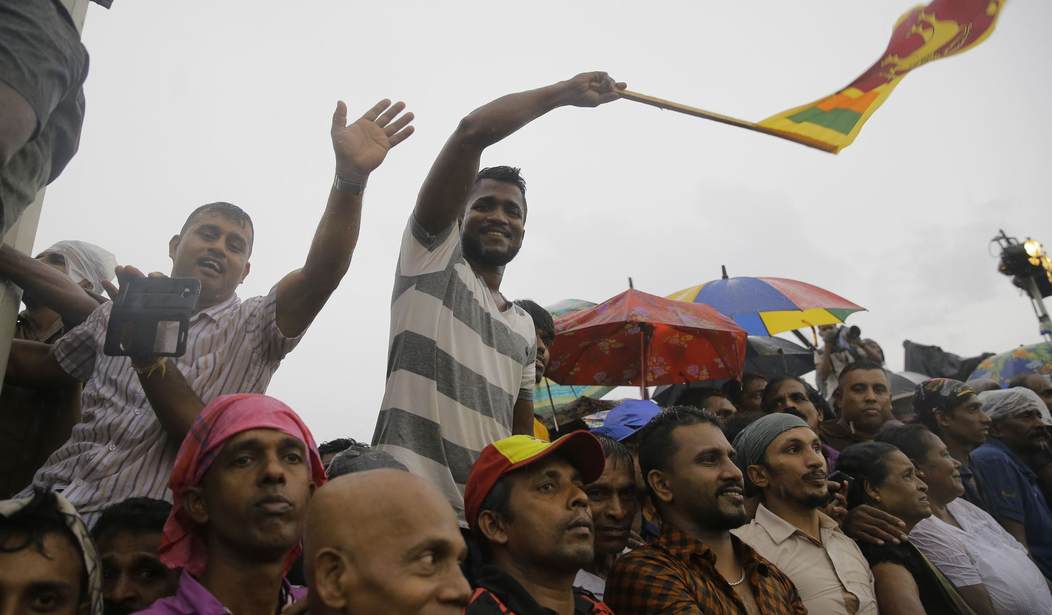Editor's note: This piece was authored by Torben Halbe.
Experts and activists lauded Sri Lanka’s decision to switch all of its farming to organic in April 2021. Now — not even two years later — there are shortages of many essential goods, and the country is engulfed in political violence. This shows that organic farming can never be more than a luxury, and that those who lobby for more should be ignored by governments around the world so that they cannot cause any more damage.
This July, political chaos in the South Asian country escalated. International reporting covered numerous human rights violations by the government as well as street fighting and the spectacular storming of the Presidential Palace by a huge crowd of protesters. The angry mob even set fire to the Prime Minister’s private residence. With the political future of the country still hanging in the balance, some media attention has turned to the underlying economic causes. However, amongst those, one organic elephant in the room received suspiciously little media attention.
In April 2021, the Rajapaksa government — the target of the current protests — instituted a sudden and complete ban on non-organic fertilizer and pesticides in a bid to turn all farming organic. Of course, this was not the sole cause of the current economic crisis, which started in 2019. But it served the death blow to an already dire situation. Farming collapsed. As protests erupted, the policy was partially rescinded, but the harvest was already lost, and with it went the livelihood of many farmers. Nearly a third of agricultural land remained unused. Food supplies were affected dramatically with rice production falling by 20%. Food prices escalated, adding to the already rampant inflation. Meanwhile, exported goods, like tea, suffered too. In a country of 22 million people, half a million people sank into poverty.
Food shortages were only the beginning. Weakened by the fertilizer ban, the country had no means to withstand the global economic turmoil caused by international anti-COVID measures and the Russian invasion of Ukraine. Starting around March 2022, a shortage of electricity and fuel, as well as of medicine and even paper for school exams left people desperate. So far, fifteen people have died while waiting in lines for essential goods.
Recommended
The disaster was not just of the government’s making. The move towards universal organic farming was advised — and at first celebrated — by international experts and activists. One such advisor, Hans Rudolf Herren of Washington-based Millennium Institute, lauded the decision he had helped to bring about, going as far as saying, “I think it has to be imposed from above. Whether people like it or not.”
And this authoritarian manner of thinking is unlikely to stop. Many proponents of universal organic farming reacted to the tragedy not by renouncing their dream of cleansing “conventional” farming from the face of this Earth, but by claiming universal organic farming was a great idea, but that its implementation in Sri Lanka was too sudden and did not give farmers time to adapt.
So, let us look at “implementations” of organic farming that were not as hasty, for example in Bhutan and the Indian state of Sikkim.
In 2008, the government of Bhutan pledged to make it the first all-organic country by 2020. However, the transition proved difficult since its organic crops achieved average yields of 24% lower than its conventional crops. By 2020, only 10% of its agricultural production was organic. Even so, the country already had to import tons of non-organic food. For the poor country, that alone made up 16% of total import value in 2017. We can only imagine at what cost it would have to import non-organic food if it ever achieved the purported 100% organic production — an aim the government has rescheduled to 2035.
Sikkim also took its time. The so-called “Organic Mission” began in 2003, and only in 2016 it was declared to be “fully organic”— all farmers were strictly forbidden to use synthetic pesticides and chemical fertilizers. By then, it was also declared “food deficient” with farming providing only 30% of the population’s needs, and at high prices. With even middle-class customers unable to afford the food, non-organic food is imported from neighboring states. Unperturbed by possible mass poverty, the state government moved to ban imports of many non-organic fruits and vegetables in April 2018. However, protests erupted since people would have been unable to pay food prices about six times as high, and luckily the plan was scrapped. Since almost no one can afford the produce, organic farming remains economically unsustainable in Sikkim, but the state government is unwilling to allow farmers to give it up.
There’s no way around it — regardless of how it is implemented, organic farming is less efficient than conventional farming. Relative to the amount of food produced, it requires more acreage, more labor, and even more water. Whether you instigate organic farming overnight as they did in Sri Lanka, or drag it out over time like Bhutan and Sikkim, attempts at universal organic farming will inevitably result in increasing food prices, food shortages, economic collapse, and human casualties.
The lessons from Sri Lanka are clear. While the market can allocate some acreage for wealthy people to pay for organic farming as a luxury, as soon as experts and activists use the power of the state to force unwilling farmers to go organic, everyone pays the price — and the poor suffer most.
Torben Halbe is a contributor for Young Voices, non-fiction author, and liberty activist based in Berlin, Germany. He holds an MSc in Biology from ETH Zurich. Follow him on Twitter: https://twitter.com/
























Join the conversation as a VIP Member